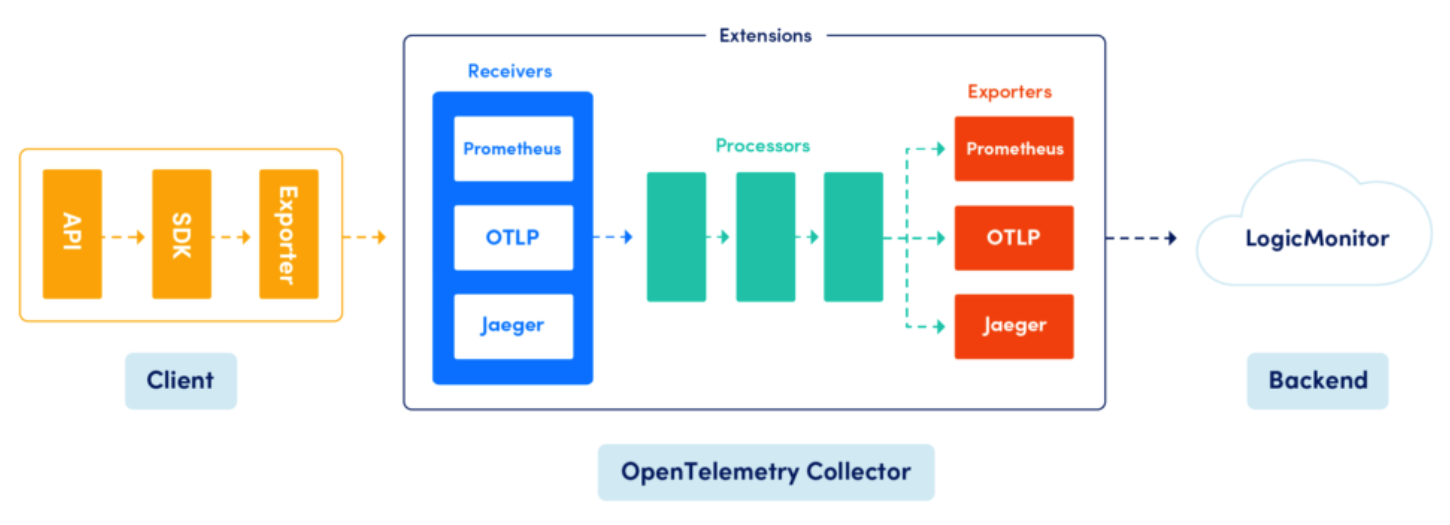OpenTelemetry Collector@テレメトリー収集ツール¶
はじめに¶
本サイトにつきまして、以下をご認識のほど宜しくお願いいたします。
01. OpenTelemetry Collectorの仕組み¶
アーキテクチャ¶
『テレメトリーコンシューマー』ともいう。
OpenTelemetry Collectorは、Receiver、Processor、Exporter、といったコンポーネントから構成されている。
otelクライアントパッケージからのテレメトリーデータを、Receiverで受け取り、最終的にテレメトリーデーターの可視化ツールにこれを渡す。
テレメトリーデータをotelクライアントパッケージからバックエンドに直接送信してもよいが、OpenTelemetry Collectorを使用した方が良い。
もし、サービスメッシュツール (例:Istio、Linkerdなど) のサイドカーモデルとOpenTelemetryの両方を採用する場合、otelクライアントパッケージの代わりに、サイドカーがプロキシ (例:OpenTelemetry Collector) にテレメトリーデータを送信する責務を持つ。

Receiver¶
▼ Receiverとは¶
OTLP形式のテレメトリーを受信する。
HTTPSで受信する場合には、SSL証明書が必要である。
▼ Prometheus Receiver¶
Prometheusにリクエストを送信し、Prometheusの持つメトリクスを収集する。
Processor¶
▼ Processorとは¶
テレメトリーを監視バックエンドに送信する前に、事前処理を実行する。
OpenTelemetryクライアントのProcessorと同じである。
Exporter¶
▼ Exporterとは¶
OTLP形式やいくつかのOSS形式 (例:Prometheus、Jaegerなど) のテレメトリーを監視バックエンドに送信する。
また、OpenTelemetryのスキーマ (semconvパッケージ) を経由して、スパンのデータ構造を変換する。
OpenTelemetryクライアントのExporterと同じである。
非対応の監視バックエンド (例:X-Ray) に関しては、その形式の監視バックエンドが提供するExporter (例:AWS Distro for OpenTelemetry CollectorのExporter) を使用する必要がある。
HTTPSで送信する場合には、クライアント証明書が必要である。
▼ AWS CloudWatch EMF Exporter¶
OpenTelemetry Collectorの持つ任意のメトリクス (例:別に収集したPrometheusメトリクス) を埋め込みメトリクスフォーマットに変換し、またAWS CloudWatchログを宛先とする。
AWS CloudWatchメトリクスは、埋め込みメトリクスフォーマットに変換されたログに基づいて、カスタムメトリクスを作成する。
例えば、AWS CloudWatchがデフォルトで対応していないメトリクス (例:Prometheus) を一度ログに変換した上で、カスタムメトリクスとして表示し直すことができる。
- https://github.com/open-telemetry/opentelemetry-collector-contrib/blob/main/exporter/awsemfexporter
- https://aws.amazon.com/blogs/mt/adding-metrics-and-traces-to-your-application-on-amazon-eks-with-aws-distro-for-opentelemetry-aws-x-ray-and-amazon-cloudwatch/
- https://qiita.com/tmokmss/items/1ad885606100f4c210d8#prometheus%E3%83%A1%E3%83%88%E3%83%AA%E3%82%AF%E3%82%B9%E3%81%AE%E5%88%A9%E7%94%A8
▼ AWS X-Ray Exporter¶
スパンをAWS X-Rayのセグメントに変換し、AWS X-Rayを宛先とする。
OpenTelemetryとX-Rayの間で互換性のないデータ (例:OpenTelemetryのAttribute) は、まとめてX-Rayのアノテーションやメタデータに変換する。
注意点として、トレースIDやスパンIDのトレースコンテキスト仕様は変換できず、そのまま転送してしまう。
そのため、X-Rayの対応するトレースコンテキスト仕様 (例:W3C Trace Context、X-Ray仕様) ではない場合、スパンを送ったとしてもX-Ray上で分散トレースを作成できない。
02. セットアップ¶
AWS側¶
▼ Terraformの公式モジュールの場合¶
ここでは、X-Rayに接続すると仮定する。
OpenTelemetry Collectorのセットアップのうち、AWS側で必要なものをまとめる。
ここでは、Terraformの公式モジュールを使用する。
module "iam_assumable_role_with_opentelemetry_collector" {
source = "terraform-aws-modules/iam/aws//modules/iam-assumable-role-with-oidc"
version = "<バージョン>"
# karpenterコントローラーのPodに紐付けるIAMロール
create_role = true
role_name = "foo-opentelemetry-collector"
# AWS EKS ClusterのOIDCプロバイダーURLからhttpsプロトコルを除いたもの
provider_url = replace(module.eks.cluster_oidc_issuer_url, "https://", "")
# AWS IAMロールに紐付けるIAMポリシー
role_policy_arns = aws_iam_policy.opentelemetry_collector.arn
# OpenTelemetry CollectorのPodのServiceAccount名
# ServiceAccountは、Terraformではなく、マニフェストで定義した方が良い
oidc_fully_qualified_subjects = [
"system:serviceaccount:opentelemetry:opentelemetry-collector"
]
}
resource "aws_iam_policy" "iam_assumable_role_with_oidc_opentelemetry_collector" {
name = "foo-opentelemetry-collector-policy"
policy = data.aws_iam_policy_document.opentelemetry_collector_policy.json
}
data "aws_iam_policy_document" "opentelemetry_collector_policy" {
# X-Rayにアクセスできるようにする
statement {
effect = "Allow"
actions = [
"xray:PutTraceSegments",
"xray:PutTelemetryRecords",
"xray:GetSamplingRules",
"xray:GetSamplingTargets",
"xray:GetSamplingStatisticSummaries",
]
resources = ["*"]
}
}
03. デザインパターンの種類¶
エージェントパターン¶
▼ エージェントパターンとは¶
テレメトリーの送信元では、エージェント (OpenTelemetry Collector) が常駐し、テレメトリーを収集する。
さらに、エージェントはテレメトリーを監視バックエンドに送信する。
▼ エージェントパターンの実装例¶
エージェントは、デーモンプロセス、サイドカー、DaemonSetなどで実装できる。
▼ エージェントパターンのデメリット¶
もしOpenTelemetryで分散トレースのみを採用しているとする。
エージェントパターンであると、スパンを作らないPodがいるNodeにまでOpenTelemetry Collectorをスケジューリングしてしまう。
スパンを作るPodがいるNodeのためだけに、OpenTelemetry Collectorを配置すればよいため、エージェントパターンは不適である。
ゲートウェイパターン¶
▼ ゲートウェイパターンとは¶
テレメトリーの送信元では、ゲートウェイ (OpenTelemetry Collector) はL7ロードバランサーを経由してテレメトリーを収集する。
さらに、ゲートウェイはテレメトリーを監視バックエンドに送信する。
▼ ゲートウェイパターンの実装例¶
L7ロードバランサーはIngressコントローラーやistio-proxyコンテナ、ゲートウェイはDeploymentなどで実装できる。
▼ ゲートウェイパターンのデメリット¶
記入中...
04. マニフェスト¶
ConfigMap¶
apiVersion: v1
kind: ConfigMap
metadata:
name: opentelemetry-collector
data:
config: |
...
DaemonSet (DaemonSetモード)¶
apiVersion: apps/v1
kind: DaemonSet
metadata:
name: opentelemetry-collector-agent
spec:
selector:
matchLabels:
app.kubernetes.io/name: opentelemetry-collector
app.kubernetes.io/instance: example
component: agent-collector
updateStrategy:
type: RollingUpdate
template:
metadata:
annotations:
checksum/config: 9e2c733798733e804f0f3840abda595a272a852f3ed54c14212a18bbcbe14d10
labels:
app.kubernetes.io/name: opentelemetry-collector
app.kubernetes.io/instance: example
component: agent-collector
spec:
serviceAccountName: opentelemetry-collector
containers:
- name: opentelemetry-collector
command:
- /otelcol-contrib
- --config=/conf/config.yaml
image: "otel/opentelemetry-collector-contrib:0.93.0"
imagePullPolicy: IfNotPresent
ports:
- name: jaeger-compact
containerPort: 6831
protocol: UDP
hostPort: 6831
- name: jaeger-grpc
containerPort: 14250
protocol: TCP
hostPort: 14250
- name: jaeger-thrift
containerPort: 14268
protocol: TCP
hostPort: 14268
- name: otlp
containerPort: 4317
protocol: TCP
hostPort: 4317
- name: otlp-http
containerPort: 4318
protocol: TCP
hostPort: 4318
- name: zipkin
containerPort: 9411
protocol: TCP
hostPort: 9411
env:
- name: MY_POD_IP
valueFrom:
fieldRef:
apiVersion: v1
fieldPath: status.podIP
livenessProbe:
httpGet:
path: /
port: 13133
readinessProbe:
httpGet:
path: /
port: 13133
volumeMounts:
- mountPath: /conf
name: opentelemetry-collector-configmap
volumes:
- name: opentelemetry-collector-configmap
configMap:
name: opentelemetry-collector-agent
items:
- key: config
path: config.yaml
hostNetwork: false
Deployment (Deploymentモード)¶
apiVersion: apps/v1
kind: Deployment
metadata:
name: opentelemetry-collector
spec:
replicas: 1
revisionHistoryLimit: 10
selector:
matchLabels:
app.kubernetes.io/name: opentelemetry-collector
app.kubernetes.io/instance: example
component: standalone-collector
strategy:
type: RollingUpdate
template:
metadata:
annotations:
checksum/config: 53da0e3c13d88832e551b80c5e4058ab64e37b0b6a27d08a06a3f09c105a9f15
labels:
app.kubernetes.io/name: opentelemetry-collector
app.kubernetes.io/instance: example
component: standalone-collector
spec:
serviceAccountName: opentelemetry-collector
containers:
- name: opentelemetry-collector
command:
- /otelcol-contrib
- --config=/conf/config.yaml
image: "otel/opentelemetry-collector-contrib:0.93.0"
imagePullPolicy: IfNotPresent
ports:
- name: otlp
containerPort: 4317
protocol: TCP
- name: otlp-http
containerPort: 4318
protocol: TCP
env:
- name: MY_POD_IP
valueFrom:
fieldRef:
apiVersion: v1
fieldPath: status.podIP
livenessProbe:
httpGet:
path: /
port: 13133
readinessProbe:
httpGet:
path: /
port: 13133
volumeMounts:
- mountPath: /conf
name: opentelemetry-collector-configmap
volumes:
- name: opentelemetry-collector-configmap
configMap:
name: opentelemetry-collector
items:
- key: config
path: config.yaml
hostNetwork: false
Service¶
apiVersion: v1
kind: Service
metadata:
name: opentelemetry-collector
spec:
type: ClusterIP
ports:
- name: otlp
port: 4317
targetPort: 4317
protocol: TCP
appProtocol: grpc
- name: otlp-http
port: 4318
targetPort: 4318
protocol: TCP
selector:
app.kubernetes.io/name: opentelemetry-collector
app.kubernetes.io/instance: example
component: standalone-collector
internalTrafficPolicy: Cluster
StatefulSet (StatefulSetモード)¶
記入中...
05. カスタムリソースを使用する場合¶
カスタムリソースを使用して、OpenTelemetryを定義することもできる。
この場合、OpenTelemetry OperatorがInitContainerを経由して、アプリコンテナにOpenTelemetryの実装を挿入する。
06. CNCFのメトリクスをクラウドプロバイダーに対応させる¶
AWS¶
▼ 仕組み¶
以下の仕組みで、PrometheusのメトリクスをAWS CloudWatch Container Insightsで監視できるようにする。
- Prometheusは、メトリクスを収集する。
- OpenTelemetry Collectorは、Prometheus ReceiverでPrometheusをスクレイピングする。
- OpenTelemetry Collectorは、AWS CloudWatch EMF Exporterを使用して、Prometheusメトリクスを埋め込みメトリクスフォーマットを持つログに変換する。
- OpenTelemetry Collectorは、AWS CloudWatchログのロググループ (
/aws/containerinsights/<Cluster名>/performance) にログを送信する。 - AWS CloudWatchログは、埋め込みメトリクスフォーマットを受信する。
- AWS CloudWatch Container Insightsは埋め込みメトリクスフォーマットを認識し、カスタムメトリクスを作成する。これは、Prometheusメトリクスにほぼ対応している。
- https://aws.amazon.com/blogs/mt/adding-metrics-and-traces-to-your-application-on-ama[…]aws-distro-for-opentelemetry-aws-x-ray-and-amazon-cloudwatch/
- https://aws-otel.github.io/docs/getting-started/container-insights/eks-infra#default-configuration-to-support-c[…]tch-container-insights-for-eks-ec2
- https://aws-otel.github.io/docs/getting-started/cloudwatch-metrics
▼ サポートしているPrometheusメトリクス¶
全てのPrometheusメトリクスにサポートしているわけでない。